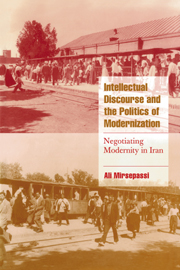Book contents
- Frontmatter
- Contents
- Acknowledgments
- Introduction: modernity and “culture”
- 1 Western narratives of modernity
- 2 Reconciling with the West's Other
- 3 The crisis of secularism and the rise of political Islam
- 4 Islam as a modernizing ideology: Al-e Ahmad and Shari'ati
- 5 German intellectuals and the culture of modernity
- 6 The tragedy of the Iranian Left
- 7 Modernities of our time
- Notes
- Bibliography
- Index
5 - German intellectuals and the culture of modernity
Published online by Cambridge University Press: 06 October 2009
- Frontmatter
- Contents
- Acknowledgments
- Introduction: modernity and “culture”
- 1 Western narratives of modernity
- 2 Reconciling with the West's Other
- 3 The crisis of secularism and the rise of political Islam
- 4 Islam as a modernizing ideology: Al-e Ahmad and Shari'ati
- 5 German intellectuals and the culture of modernity
- 6 The tragedy of the Iranian Left
- 7 Modernities of our time
- Notes
- Bibliography
- Index
Summary
Introduction
This chapter lays out a comparative analysis of intellectual discourses in Germany between the World Wars as a means to further explore, and strengthen, the argument that social movements based on discourses of authenticity are internal to modernity, and in fact represent a common means through which “cultures” attempt to localize the course of modernization. Detailed examinations of the work of Junger and Heidegger show how they constructed versions of modernity rooted in German traditions. By exploring their claims, we can further understand the centrality of discourses of authenticity as a cultural, intellectual, and political response to modernization.
The works we have examined so far make abundantly clear that by defining modern experience as lacking in “soul,” “substance,” or “meaning”, particularly on the “collective” level, intellectuals like Shari'ati and Al-e Ahmad were not envisioning a new form of protest within the modernist discourse; on the contrary, they echo a constant, reappearing, and troubling aspect of modernity which is anything but unfamiliar to Western intellectuals. The situation of alienation they describe is evoked in nearly every major narrative representing the modern situation. This dilemma is made much of, not only in the mystical or religious-inspired works of, for example, Heidegger and Kierkegaard, but also in the self-proclaimed scientific narratives of modernity by writers such as Weber and Marx. For Weber, the experience of modernity is an “iron cage”, a rootless world without any meaning. Indeed, he viewed modernity as an endless search for meaning by its very nature. In the early Marx, where social alienation from the self is a key concept, religion is presented as “the spirit of a world without spirit.”
- Type
- Chapter
- Information
- Intellectual Discourse and the Politics of ModernizationNegotiating Modernity in Iran, pp. 129 - 158Publisher: Cambridge University PressPrint publication year: 2000



